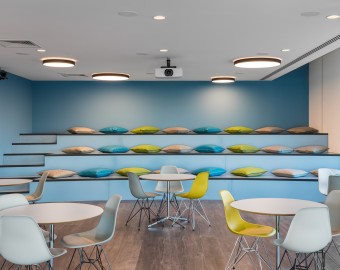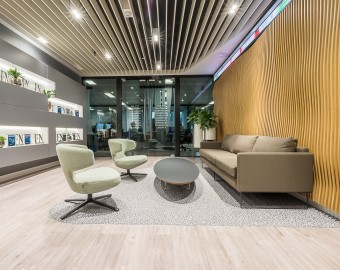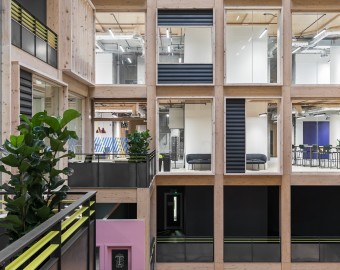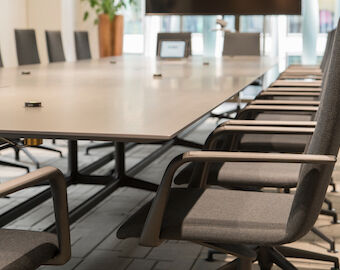Office Occupancy Rates Across Europe
An in-depth UK survey conducted in late 2023 by JLL revealed that an overwhelming 87% of respondents were encouraging their members of staff to work from the office ‘at least some of the time’. Interestingly, the survey also suggested that the number of people working fully remotely dropped from around 40% to just one in five by the end of the year, but the picture is mixed across the continent of Europe.

Office occupancy rates in more detail across the different countries
France and Belgium seem most likely to be in the office, with an average 3.5 days a week there and 1.5 days remote, and that’s largely due to it being a compulsory arrangement. Countries such as Spain, however, appear to be offering more self-determinism to staff by allowing them to decide which modus operandi suits them best. In fact, Germany, the Netherlands and Spain are less keen to return, with an average of 2.5 days working from the office as staff are effectively allowed to vote with their feet.
Interestingly, we seem even less keen with a study conducted in August 2023 suggesting that UK businesses were averaging 1.6 days a week in the office. Some businesses are now beginning to align with our European collegues and are suggesting a specific number of days in the office. The question now facing all UK employers is whether to impose a certain number of attendance days on their teams or to continue with a more flexible arrangement.
Lord Alan Sugar comments on remote working
A prominent figure in the form of Lord Alan Sugar recently reignited the public debate around working from home with some predictably trenchant opinions, the most quotable of which was:
‘I understand why [remote working] happened during Covid, but I’m totally against it, quite frankly. I think it is bad for morale, bad for learning. I know I learn from being with other people, in an office, and you don’t learn sitting at home in your pyjamas in front of a Mac.’
While some senior managers might agree, in reality there’s little doubt that – post-pandemic – a large number of employees have become accustomed to the freedom that working from home delivers, so much so that it may be a deal breaker to force them to return to the office. Quality time with the children and/or the dog, the absence of wasted hours of commuting and the avoidance of irritating office politics are all potential benefits of the working from home model.
And to further counterbalance Lord Sugar’s argument, it’s emerging that certain employees – in particular those with neurodivergent conditions such as ADHD – have flourished under a hybrid arrangement. Being able to work in familiar domestic surroundings has increased productivity and job satisfaction among this hitherto under-represented group. Leah Steele, an executive coach and founder of Searching for Serenity, underlines this important development:
‘We’re seeing a lot of people going back into an office environment who’ve got used to being able to focus and concentrate. And they’re going into an open-plan office and things are suddenly amplified. It was normal for [neurodivergent people] to be distracted and tired all the time, and they didn’t need to commute two or three hours a day. Suddenly an open-plan office feels overwhelming.’
Working from home can have health benefits
The overall health benefits of working from home are also coming to the fore, with staff finding that they have time to prepare healthier meals and can feel more relaxed, schedule exercise and reduce their blood pressure. A tangible outcome of this is that these employees are likely to take fewer sick days, despite potentially working longer hours. In terms of diet, it appears that working at home during the pandemic contributed to the consumption of more fresh fruit and vegetables, as well as dairy items, healthy snacks and home-made meals, with younger workers and females leading the way.
On the flip side, however, is the lack of socialisation, collaboration and creative thinking that comes from being in the same workspace as your colleagues. In truth, your preference will largely depend on the nature of your work and your personality, so should employers be making attendance mandatory or treating everyone on a case-by-case basis? Only time will tell.
Some words from Matt Brookes...
Matt Brookes, Associate Design Partner at The Workspace Consultants, believes that how companies address the ongoing back to the office issue will have implications for the workspaces of the future and, as a result, for office designers too. ‘Office design is at something of a crossroads,’ comments Matt. ‘As well as seeing the expected downsizing that appeared to be inevitable as companies switched to a hybrid or fully remote model, we’re now also seeing clients upsizing. And whether they’re reducing their space, sticking with what they have or expanding their square footage, the challenge is to create an office experience that delivers – as far as possible – an ideal environment for everyone. Increasingly, the employees are being placed at the heart of the design process because employers are recognising that retaining them is the best route to stability and profitably. Whether making attendance in the office compulsory is the way to achieve that will inevitably become clear in the years to come.’
The Workspace Consultants specialise in office design and project management for clients in Cambridge, London and Manchester. If you’re looking to rethink your workspace, call us on 01223 656111 or complete our enquiry form to arrange an initial consultation.



